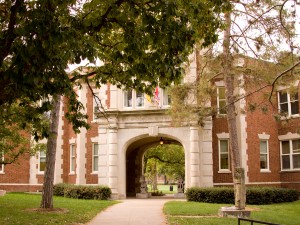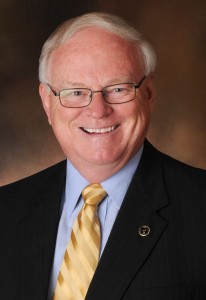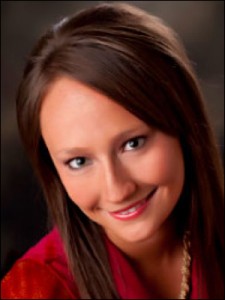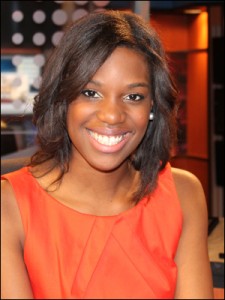The Missouri School of Journalism Will Recognize 129 Graduates at December Commencement
The Ceremony Begins at 3:30 p.m. on Friday, Dec. 14, in Jesse Auditorium
By Chantel O’Neal
Master’s Student

Columbia, Mo. (Dec. 6, 2012) — The Missouri School of Journalism will hold its December graduation ceremony at 3:30 p.m. on Friday, Dec. 14, in Jesse Auditorium. Seating will be open. Family and friends do not need tickets.
A total of 129 graduates will be recognized.
Graduate degrees will be awarded to six doctoral candidates and 26 master’s recipients, two of which earned their degrees online.
Of the 97 graduating seniors, approximately 26 percent will be recognized with Latin honors, which are awarded to undergraduates with a grade point average of 3.5 or higher for their last 60 graded credit hours.
The top 10 percent of the school’s graduates will be invited to join Kappa Tau Alpha, the national honor society for students majoring in journalism and mass communication. The Kappa Tau Alpha reception will be held prior to commencement, from noon to 1 p.m. in room 100-A of the Reynolds Journalism Institute.
This year’s inductees are:
Doctor of Philosophy Student
-
- Joonghwa Lee
Master of Arts Students
-
- Aida Sherif Amer
- Chelsea Reynolds
- Stephanie Brooke Wurtz
Bachelor of Journalism Students
-
- Shaina Ruth Cavazos
- Kristen Nicole Delia
- Natasha Nushik Desai
- Jacklyn Suzanne Krupp
- Melissa Jean Leneweaver
- Megan Susan McGinnis
- Suyoung Moon

The alumnus speaker will be Brian S. Brooks, BJ ’67, MA ’69. Brooks came to the Missouri School of Journalism in 1974 after working in Vietnam as an information officer (for which he received a bronze star) and as a reporter, copy editor and night city editor at the Memphis (Tenn.) Press-Scimitar.
He served as news editor and then as editor of the Columbia Missourian before becoming director of the Journalism Network in 1989. Along with faculty member Phill Brooks, he was responsible for bringing a $15 million grant from IBM Corporation to the School of Journalism from 1989 to 1997. While on sabbatical from 1997 to 1999, Brooks was editor of The Stars and Stripes, the U.S. military newspaper in Europe. He directed that newspaper’s coverage of the Bosnia mission, the U.S. entry into Kosovo and the bombing of Belgrade. For this work, he was awarded the Department of Defense Civilian Distinguished Service Medal.

For more than 30 years, Brooks has served as deputy director or director of the Dow Jones Newspaper Fund editing internship program at Missouri. Students from schools nationwide are trained at the summer workshop for careers as newspaper copy editors.

He is the author or co-author of four major journalism textbooks, including The Art of Editing (Allyn & Bacon Inc., 2009). Brooks was chairman of the school’s editorial department from 1999 until January 2003, when he became associate dean for undergraduate studies and administration. That same year he was named Outstanding Faculty Member on campus by the MU Greek system. He was inducted into the Missouri Press Association‘s Newspaper Hall of Fame in 2009.
The master of ceremonies will be Kristen Delia, a strategic communication major from O’Fallon, Ill. Delia will graduate magna cum laude with an Honors College Certificate. She is an inductee into Kappa Tau Alpha and was selected to be a Homecoming Royalty Top 30 candidate this fall. Delia served as president of Journalism Student Council, account executive for MOJO Ad and chair of Organization Resource Group. After graduation, she will be employed as marketing coordinator for BJC Medical Group in St. Louis.
The student graduation speaker will be Stacy Ike, a radio-television journalism major with a social work minor. Ike, from Houston, reported and anchored for KOMU-TV, served as an executive member of Ale Chapter of the National Association of Black Journalists, was on the event staff for the University of Missouri Student Life and served as a community adviser for Residential Life. Her junior year, Ike was inspired to start a website called justNAOMI.com, which stands for Not Afraid of My Imperfections. After graduation, she plans to live in Australia for six months and then pursue entertainment journalism.
Commencement Address by Stacy Ike
Good afternoon, fellow graduates, professors and families. There is something about standing up here that is both amazing and terrifying. And I am sure there is something about the seats that you are all sitting in that may evoke a similar emotion.
Parents, you are probably thinking, “Thank God, my child made it.” Or, “I hope they know when I get old, I am moving in.”
Younger siblings, you are probably thinking, “I hope they know they are not getting their old room back.”
Graduates, my fellow graduates, I assume you are thinking, “Thank God I don’t have homework this weekend. OMG. I don’t have any homework this weekend, and if I don’t have homework this weekend, then what’s next?”
Now, in response to all those conflicting thoughts, to the parents, “Don’t worry, we will pay you back; but you might not be able to live with us.” I’m just saying.
To the siblings, “Please fix up my room because the economy is pretty bad, and I might need a place to crash.”
And to my fellow graduates, the sign of no homework means we did it. We crossed through a threshold that 40 percent of people will never see. We wrote, rewrote, designed, Photoshop-ed and anchored right into the seats we are now. I’m pretty sure we kept Starbucks in business.
This morning, I thought about my list of dreams and goals that never happened. You probably have one of these, too. The organization we wished we would have joined, or the story we wished we would have told, or that “A” we wish we could have gotten. And, of course, because we are all over-achievers, the list goes on and on. But then I looked at the top of my list and guess what it said? “No homework!”
I realized then that we all get to start a new list. A list of lessons that we still want to learn, a list of jobs we can’t wait to have, and a list of experiences we have been waiting for since we came through the columns. The fear of the unknown is ever-present, but the lack of homework makes up for it. Now is that time for us. People always graduate with the intention of “saving the world,” but there is something about saying it here in Jesse Hall that makes it sound so possible. We can do so much in the different places that we end up, and by God’s grace, we will meet at the finish line.
Professors, you changed our lives in ways you will never understand. The J-Cafe kept us nourished right before Broadcast II and right after Cross-Cultural Journalism. As classmates we worked, laughed and cried with each other. Faith, courage and hard work have brought us this far. If there is one thing we all learned at Mizzou, it is that those traits will lead us to success.
We are proud to say we are Mizzou grads. We are even prouder to say we are J-School grads. And we are especially proud to say we are Tigers! Congratulations to the December class of 2012. And remember, your list is still unwritten.
Commencement Address by Brian S. Brooks
Thank you, Kristen. Graduates, family members, friends, and distinguished members of the faculty. It’s a pleasure for me to have the opportunity to speak today. I’ve devoted my life’s work to this School, and it indeed is an honor.
Graduates, I recently tried to count the number of graduations I have attended over the years, and I finally determined that the number was somewhere around 150. In doing that, I thought of a couple of memorable commencement occasions. One was in June 1969 when I received my master’s degree. The graduation ceremony was held in front of Jesse Hall on Francis Quadrangle, and it was an overcast day. Despite that, the powers that be decided to go ahead and hold the ceremonies for the Graduate School outdoors. The speaker gave his speech and each dean then presented diplomas to his or her graduates. It was cloudy and misty throughout the ceremony until Dean Earl English of the School of Journalism arose to present the journalism degrees. Just as Dean English, a man with a wry sense of humor, approached the lectern, the skies parted and the sun came out. His first words were, “The sun always shines on the School of Journalism.” He presented the degrees, and precisely at the moment he stepped away from the lectern, the clouds and mist returned. It was one of those moments when you say, “I can’t believe that just happened.”
A second wonderful memory was a May commencement when the speaker was Andy Rooney, the old curmudgeon who used to do the closing commentary on CBS’ “60 Minutes.” This day also was a rainy one, so the ceremony, which had been scheduled for Peace Park, was moved to our alternate location, the Missouri United Methodist Church. Most of you probably haven’t been in that building, but the sanctuary there is a beautiful space with an impressive pipe organ, magnificent stained-glass windows, a hand-carved altar imported from Europe and a raised pulpit from which the minister delivers his or her sermon each Sunday. On this occasion, Rooney was introduced and climbed the steps to the pulpit. Rather than beginning his speech immediately, he paused for a good 20 seconds and deliberately looked around the room in different directions. Finally, he intoned, “I’ve never been in a place like this before.” That brought down the house, and the old curmudgeon had his audience spellbound.
But despite those memorable moments, it occurs to me that most commencement addresses are imminently forgettable, and this one probably will not be an exception. I recently did an informal survey of friends and asked them who spoke at their undergraduate commencements. Only 10 percent could name the speaker, and not a one could remember anything he or she said.
My takeaway from that is that doing this is an exercise in futility. Nevertheless, graduation speakers are expected to impart words of wisdom to the graduates, and I will attempt to do that in keeping with the tradition. I’ll also try to keep it brief and simple.
While you were here, you learned how to practice journalism and strategic communication the right way from the best professors in the world. So you learned what to do in your profession. I also hope you learned what NOT to do.
In the end, I suspect that this distinguished faculty has crammed your brain with so much information that you can remember only a fraction of it. You have been presented with gigabytes of information, and your brain holds only megabytes. Or, if you’re like me, kilobytes. Such is the nature of higher education; we are given much more than we can retain. So now, on this your Graduation Day, I wish to simplify all of your university experience by suggesting that seven simple words are the key to success in your profession and in your life. Those words are these:
Learn from history. Work hard. Be honest.
I suspect that some teacher once posed a question to you that went something like this: If you could sit down and talk with any historical figure, who would it be?
I’ve thought about that a lot over the years, and I finally have narrowed my choices to three. The first would be Thomas Jefferson, who won many admirers with his intellect and commitment to democratic government.
My second choice would be my sixth great-grandmother, Jane Wilson Gladney. After her husband died in County Antrim, Ireland, she took her six children – five sons and a daughter – by ship to South Carolina, where the British were giving free land to settlers. The area from which they came is now Northern Ireland – cold and windswept with rocky soil – so farming was tough. South Carolina promised longer growing seasons and a better future, so Widow Jane, as she was known to her South Carolina contemporaries, took a leap of faith and moved her family to a new continent in 1767.
Her two eldest sons, one of them my fifth great-grandfather, soon found themselves fighting alongside Francis Marion, the legendary Swamp Fox, against the British, led by Lord Cornwallis. When the colonists scored their big victory over the Brits at King’s Mountain in October 1780, Cornwallis withdrew to Winnsboro, South Carolina, where he wintered. Just outside Winnsboro was Widow Jane’s plantation, and the tough old bird vowed to kill Cornwallis with a muzzle loader if he dared set foot on her property. He didn’t, and the next year Widow Jane died. I would have eagerly sat down and listened to every word she said. She was a remarkable woman.
My third and final choice for a chat with a figure from a bygone era would be Walter Williams, founder of the School of Journalism. I’ve been fascinated by this man ever since I learned about him as a student here in the 1960s. Here was a man from Boonville, Missouri, who became not only the first dean of the world’s first School of Journalism but also president of the University of Missouri. If you don’t think that’s remarkable, consider this: Williams had no college degree, and it’s debatable whether he actually completed Boonville High School. So here’s a man who was so highly respected that he was tapped to become president of a university without benefit of a college degree.
Here was a man who, despite growing up in the middle of the United States, became a figure known throughout the world for his leadership in professionalizing our field. He was first and foremost a citizen of the world. He made three trips to China in his lifetime at a time when travel to the Orient and back was a long, long journey by ship. He also toured Europe and the Middle East not too many years before his death, and he was treated like royalty at every stop.
About 15 years ago, I was teaching a news-writing class and was extolling the virtues of Dean Williams and the Journalist’s Creed, his eloquent statement outlining the roles of journalism and advertising in our society. Finally, one young man in the class raised his hand and asked, “Professor Brooks, what was Walter Williams like?”
I’m smart enough to know that someone my age seems as old as Methuselah to a young college student, but still, the comment caught me off guard. I gathered my thoughts and replied, “Well, I’m afraid I can’t answer that. Dean Williams died in 1935, and I wasn’t born until 1945.”
The young man was a bit embarrassed by my comeback, but it wasn’t my intent to embarrass him. He had no reason to know when Williams died or when I was born. To him, all that was ancient history. At the end of class, the student came to me and apologized. I assured him I wasn’t troubled by the incident at all and suggested that he might want to learn more about Dean Williams. I took him to my office, pulled out a biography of Williams and lent it to him. In doing that, I attempted to take an embarrassing moment for the young man and turn it into a teachable moment.
When I retired in September of this year, I got a nice note from that former student. He reminded me of the incident and told me how mortified he had been when I pointed out the gap between Williams’ death and my birth. He told me how much he appreciated the way I dealt with his gaffe. He said he learned a lesson that day in how to deal with people who make uninformed remarks.
As I’ve thought about those three historical characters – Thomas Jefferson, Jane Wilson Gladney and Walter Williams – it has occurred to me that each of them was a trailblazer willing to stick up for what he or she believed.
All three also were flawed human beings. Jefferson wrote that all men are created equal yet owned slaves and acquiesced to a Constitution that ignored the rights of women and treated an African American as three-fifths of a person. Widow Jane happily accepted free land from the British yet turned on them just a few years later and threatened to shoot their commanding officer on sight. Walter Williams was an abject failure at his first job – bookkeeper at the state penitentiary. Yes, even then, journalists were lousy at math.
So we learn from history, but we also have to understand the context in which historical events occurred. If we do that, we learn from successes and failures.
Graduates, while you were here we asked you to learn a bit about history, which doesn’t seem to be a subject as attractive to you as it was to those of my generation. I would suggest to each of you, however, to remember an oft-repeated phrase: “He who ignores history is doomed to repeat it.”
So, I hope you will study the historical figures most important to you. Look at what they did right, and look at what they did wrong. Doing that can help you avoid making the same mistakes they made. And rest assured that they all made mistakes. We all do. No one among us is perfect.
Teaching is a wonderful profession. There is no more important thing than what we do, which is to pass information from one generation to the next. As humans, imperfect as we are, we learn from what works. We learn from what doesn’t.
The rest of my advice is simpler. Work hard. Be honest. Neither of those requires any elaboration. So, if 10 years from now you can’t remember my name, as I suspect will be the case, at least remember my suggestions to you:
Learn from history. Work hard. Be honest.
Learn from history. Work hard. Be honest.
If you do those things, I sincerely believe you will be successful and your life will be rewarding.
And remember this: The sun always shines on the School of Journalism.
Thank you.
Updated: July 13, 2020